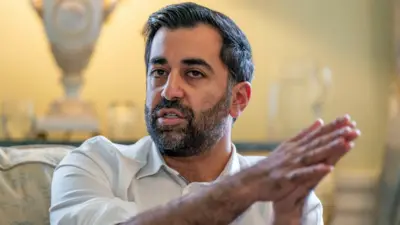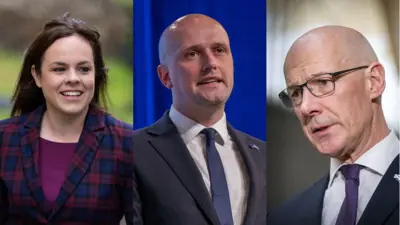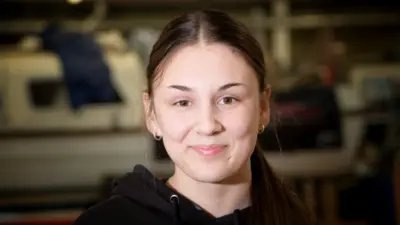We've updated our Privacy and Cookies Policy
We've made some important changes to our Privacy and Cookies Policy and we want you to know what this means for you and your data.
Everything you need to know about the Avon and Somerset PCC election
- By Michelle Ruminski & Chloe Harcombe
- BBC News, West of England
Image source, Stephen Sumner
The role of the Police and Crime Commissioner (PCC) for Avon and Somerset Police is up for election.
The position was first introduced in 2012 in a bid to reform policing.
Members of the public are given the opportunity to vote for a candidate every four years.
This year's ballots will open on 2 May - the same day as the local elections in Bristol.
What does the PCC do?
The main role of the PCC is to ensure that Avon and Somerset Police is doing its job properly by serving the public and overseeing the strategic direction of the force through the Police and Crime Plan.
It is also the PCC's job to set the police budget, and to decide how much money the public should contribute to policing through council tax.
The PCC is also in charge of appointing the chief constable - who is currently Sarah Crew - and holding them to account for the performance of the force's officers and staff.
The PCC is answerable to the public and is expected to build and maintain trust by consulting with local people, the council and other organisations.
They are expected to maintain safety within the community and to reduce crime through means such as outreach programmes.
Who is standing for the role?
Four political parties are nominating candidates for the upcoming election.
Benet Allen - Liberal Democrat
Image source, Benet Allen
The former deputy leader of Somerset West and Taunton Council was born in Taunton and now lives in Minehead.
He has also been the portfolio holder for Communications and Corporate Resources, has previously worked in television news and is a trained helicopter pilot and aerial cameraman.
Katy Grant - Green Party
Image source, Green Party
Katy Grant has represented the Clifton Ward since 2021 and is a magistrate with the Avon and Somerset Bench.
Prior to this, Ms Grant lived for 20 years in conflict and humanitarian contexts such as Somalia, Chad, and Afghanistan, and has worked with the United Nations.
She has worked in refugee camps and on borders, with a focus on the protection of women and children in the context of war and disaster.
Clare Moody - Labour
Image source, Clare Moody
She is the chief executive of an equality and human rights charity, where she has worked on issues relating to violence against women and girls.
Between 2014 and 2019, she was a Member of the European Parliament for the south west and held the position of vice chair of the Security and Defence Committee, covering EuroPol.
She also spent time working in Downing Street, and worked for a trade union for 20 years.
Mark Shelford - Conservative
Image source, Mark Shelford
The current PCC, Mark Shelford, is seeking re-election.
Since he was elected to the role in 2021, Mr Shelford has stood as the national PCC lead for economic and cyber-crime, and the chair of the Local Criminal Justice Board and the Prisoners Building Homes programme that aims to reduce re-offending.
Prior to working as the force's PCC, he served as a local councillor and was the deputy leader of Bath and North East Somerset Council until 2019. Before that, he was an army officer for 32 years
Why was the PCC role created?
When the Conservatives and Liberal Democrats formed a coalition government in 2010, they agreed to making policing more accountable.
The coalition introduced reforms that included electing a PCC for every police authority in England.
The first PCC elections took place in 2012.
Image source, PA Media
What is different about the elections this year?
For the first time, voters attending the polls will be required to bring ID with them.
The upcoming PCC election will use the first-past-the-post voting system.
It is the traditional system, which is used in general and local elections, and appoints the candidate with the most votes.
Previously, PCCs have been elected using the supplementary voting system, which allowed votes to choose a second favourite candidate if they had one.
The winning candidate would have to pass 50% of the vote in order to win the election, sometimes using second preferences to secure the position.
Chloe Smith, the former minister of state for constitution and devolution, said the supplementary vote system was "confusing and over-complicated" compared to the "tried and tested" first-past-the-post system.
However, the Electoral Reform Society, argued that first-past-the-post was the least representative system.
Follow BBC Somerset on Facebook and, X. Send your story ideas to us on email or via WhatsApp on 0800 313 4630.
Top Stories
Features & Analysis
Most read
Content is not available








